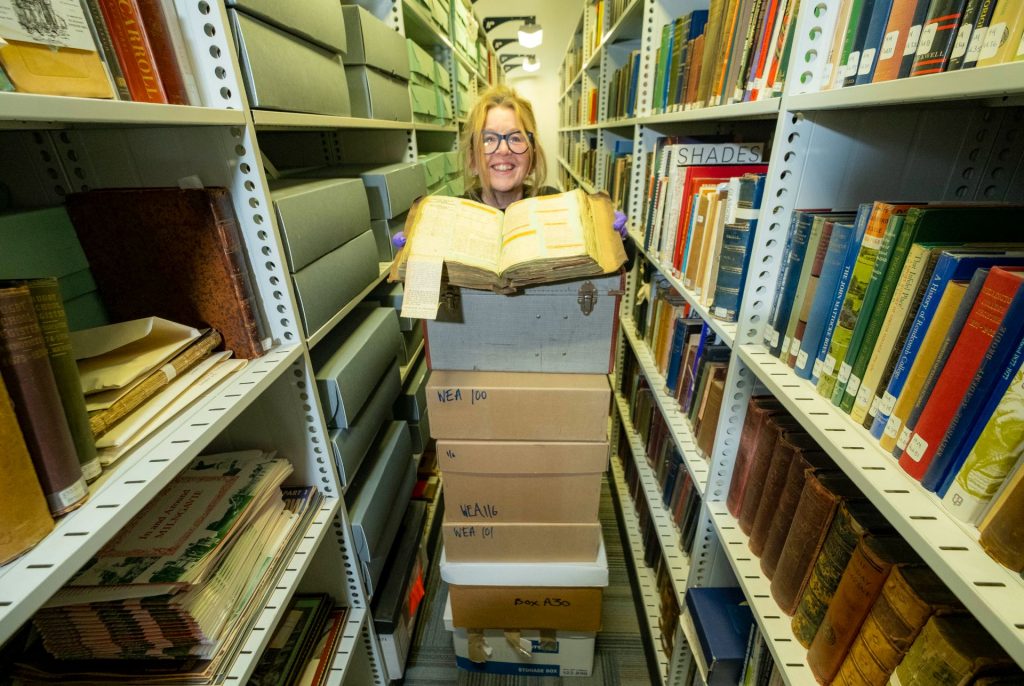On the 24th January 2022 – International Day of Education – GCU Archive Centre are delighted to announce that the Workers Education Association Scotland story will be preserved, catalogued and made available for the use of current and future generations. WEA Scotland have played an important role in education for the common good over almost 120 years to date and now their historical records will begin a new life as a research resource, available to all. First discussed in early 2020 it was not until September 2021 that the full collection arrived here. This was, of course, mainly due to restrictions caused by the pandemic.
Our guest blogger Ray McCowan is the Director of the WEA Scotland. Here he tells the story of bringing their archives together and creating a national heritage collection.

Carole McCallum (University Archivist) with a small part of the archive © Peter Devlin
Glasgow Caledonian University to host the WEA Scotland national archive; the backstory
In 2016, WEA Scotland were delivering outstanding learning experiences to their beneficiaries, but were facing significant financial challenges. Costs were too high relative to the levels of income earned. Property costs, in particular, were prohibitively expensive. The WEA Scotland Board agreed to a number of property moves to reduce costs and improve the quality of facilities for learners, staff and members. As these moves took place, it quickly became apparent just how many books and materials had accumulated over the years. In some cases, this material was stored in conditions that posed a risk to its long-term preservation. There was a further risk in that there was no single record and no single organisation-wide view of what was stored, and where it was stored.
After taking professional advice on this issue, the WEA Scotland Board agreed that the best way to preserve this material for the WEA and the wider community in Scotland was to establish a national archive centre for WEA Scotland. After a number of discussions and appropriate due diligence, Glasgow Caledonian University agreed to host the WEA Scotland National Archive. All that was needed now was to get the material there…
What started as quite a simple exercise in locating our archive material quickly transformed into the search for the Holy Grail. In all of our offices, there was quite predictably files, boxes and filing cabinets full of materials and multiple copies of seemingly every WEA project report since 1903. Material was also located in a number of regional archive centres and libraries across Scotland. Less predictable was the discovery that when the storage space in our offices had eventually burst at the seams, additional material was located in external storage facilities across Scotland, including a garage in Ayrshire!
Faced with such a large volume of material the challenge was to determine that which was of true legacy value and that which was not. Books with minimal financial value, or were easily accessible in public or university libraries were excluded. Books and materials that illustrated the WEA’s legacy and heritage, or were important works in the history of adult education, were retained.
An unexpected discovery during this process was that amongst the books in the Edinburgh office were the remnants of the P. M. Dott Memorial Library. Dr Eric Dott established this subscription library of over 1000 books in December of 1937 in memory of his father, Peter McOmish Dott, an Edinburgh art dealer with a long-term interest in supporting non-partisan socialism. For 20 years this library made an important contribution to non-partisan political life in Edinburgh. The presence of 100 surviving books with ‘P. M. Dott Memorial Library’ stamps or date labels was explained by the discovery that their first Librarian was a young socialist activist, Jack Kane, who in later life ran the WEA office in Edinburgh, became an elected Labour Councillor and eventually the Lord Provost of Edinburgh. As well as the surviving books, the WEA also has the Minute Books and original 1938 book catalogue of this important library. It grew to have 1000 members and 8000 issues in its first year, with eventually 3000 books, including novels and plays, on its shelves.
While this process of sifting and scrutiny sounds straightforward in principle, the scale of the task was immense. After an initial sift of material in all the WEA Scotland offices, over 400 boxes of possible archive material went to our offices in Kilmarnock for further scrutiny. Over a number of months, WEA Scotland staff and Christine Ewing, a retired Ayrshire archivist, Kirstine Simpson, a former WEA Scotland Manager and Norman Newton, a retired librarian and former member of the WEA Council and Scotland Board, painstakingly determined the material that was of significant legacy value and should be part of the future WEA Scotland National Archive Centre.

Ray McCowan (WEA Scotland Director) delivering the first boxes to the Archive Centre in December 2020
With that internal scrutiny complete, the remaining task was to secure the release of the materials from regional archive centres and libraries across Scotland. WEA Scotland and Glasgow Caledonian University are very grateful for the support and cooperation given by Highland Archives, Aberdeen Archives, Edinburgh City Archives and Glasgow Archives in making this WEA Scotland material available to our National Archive Centre at Glasgow Caledonian University.
With all the WEA Scotland material now secure at Glasgow Caledonian University, the immediate and ongoing challenge is to maintain the currency of our National Archive Centre by creating an annual timeline and process by which material moves from the WEA to our National Archive Centre. With this exercise now complete, and with the guidance and expertise from Glasgow Caledonian University going forward, WEA Scotland is now confident its legacy is in safe hands.